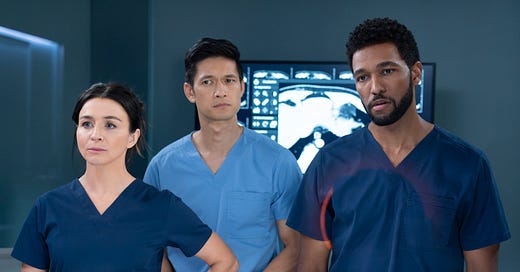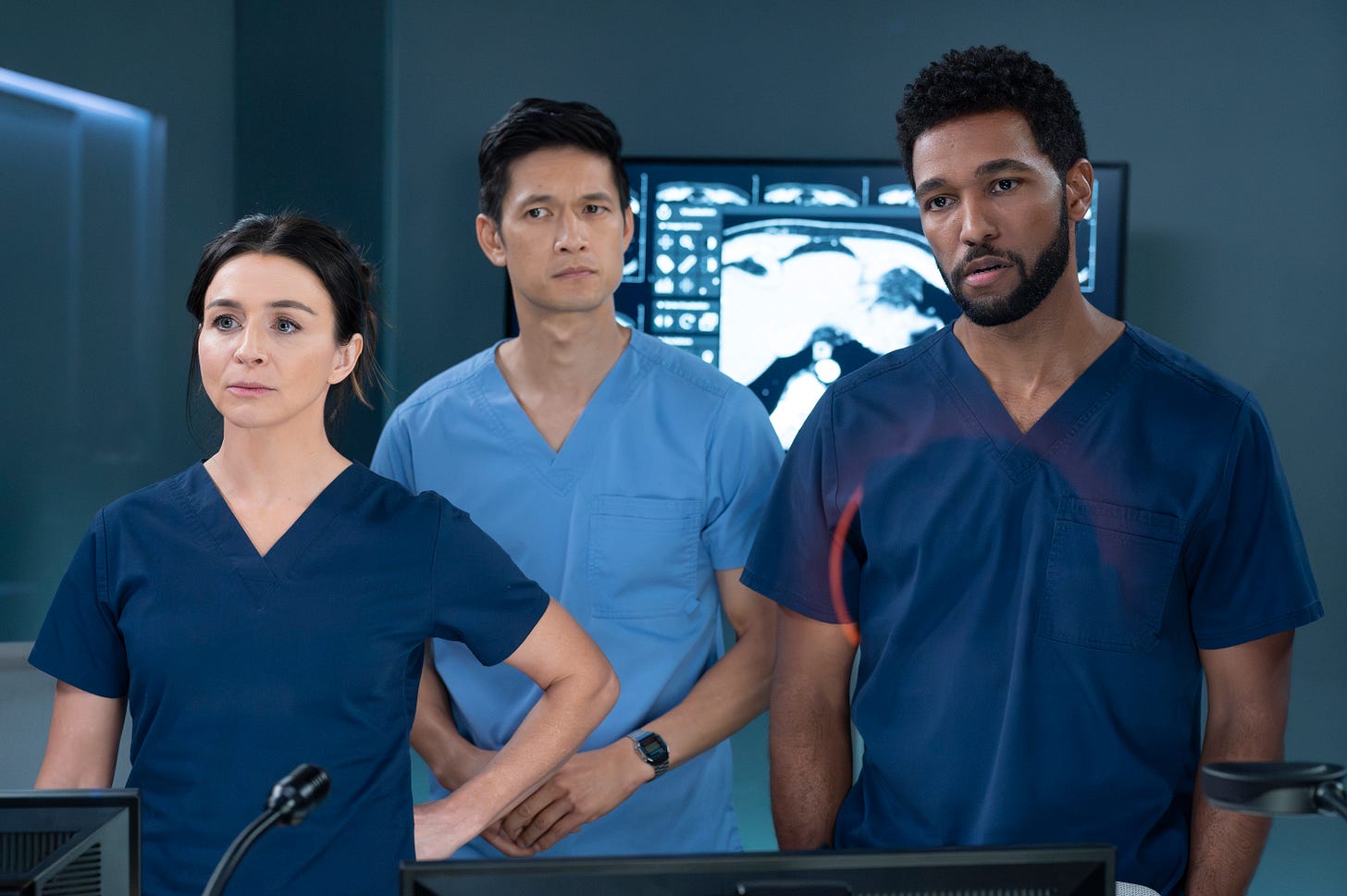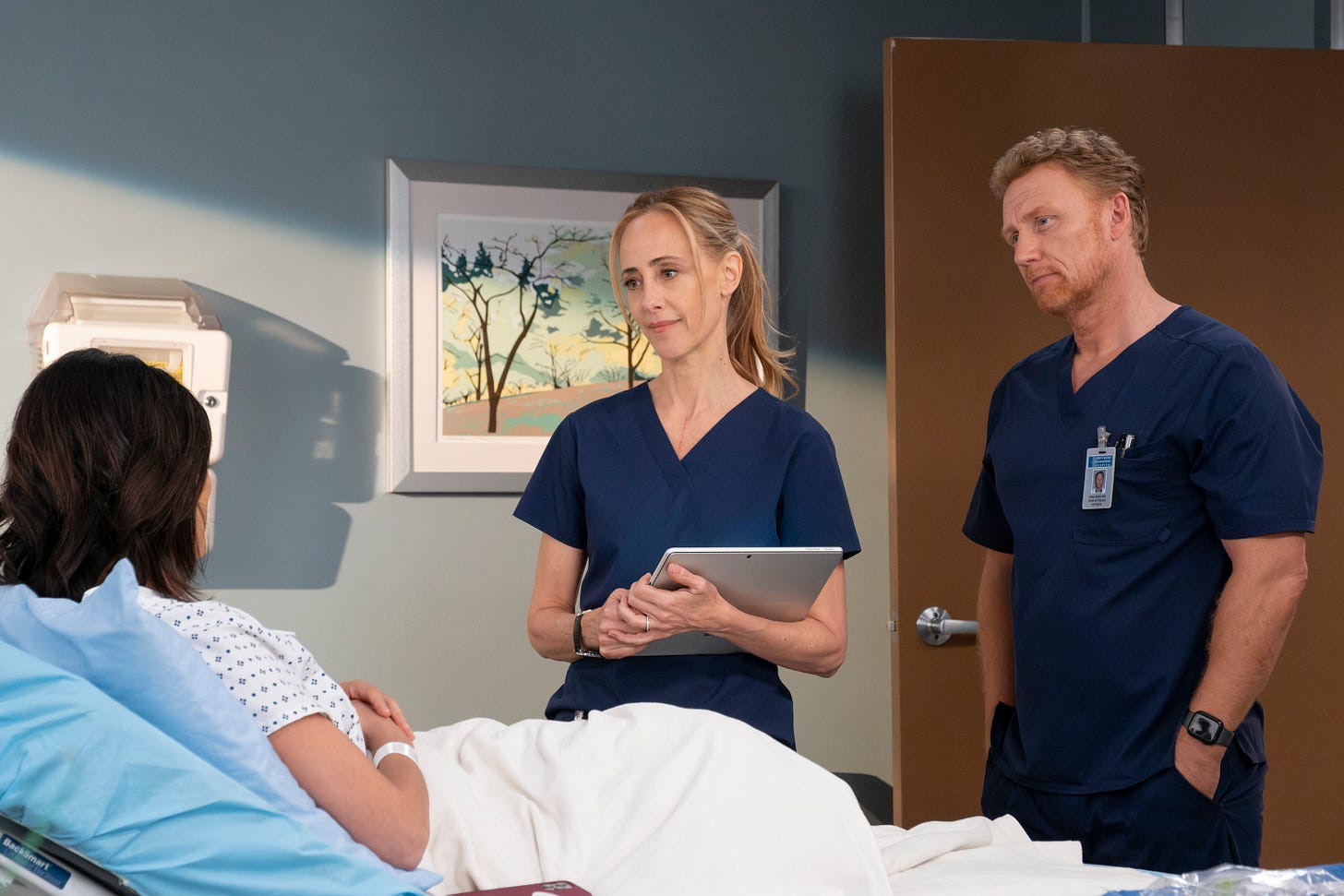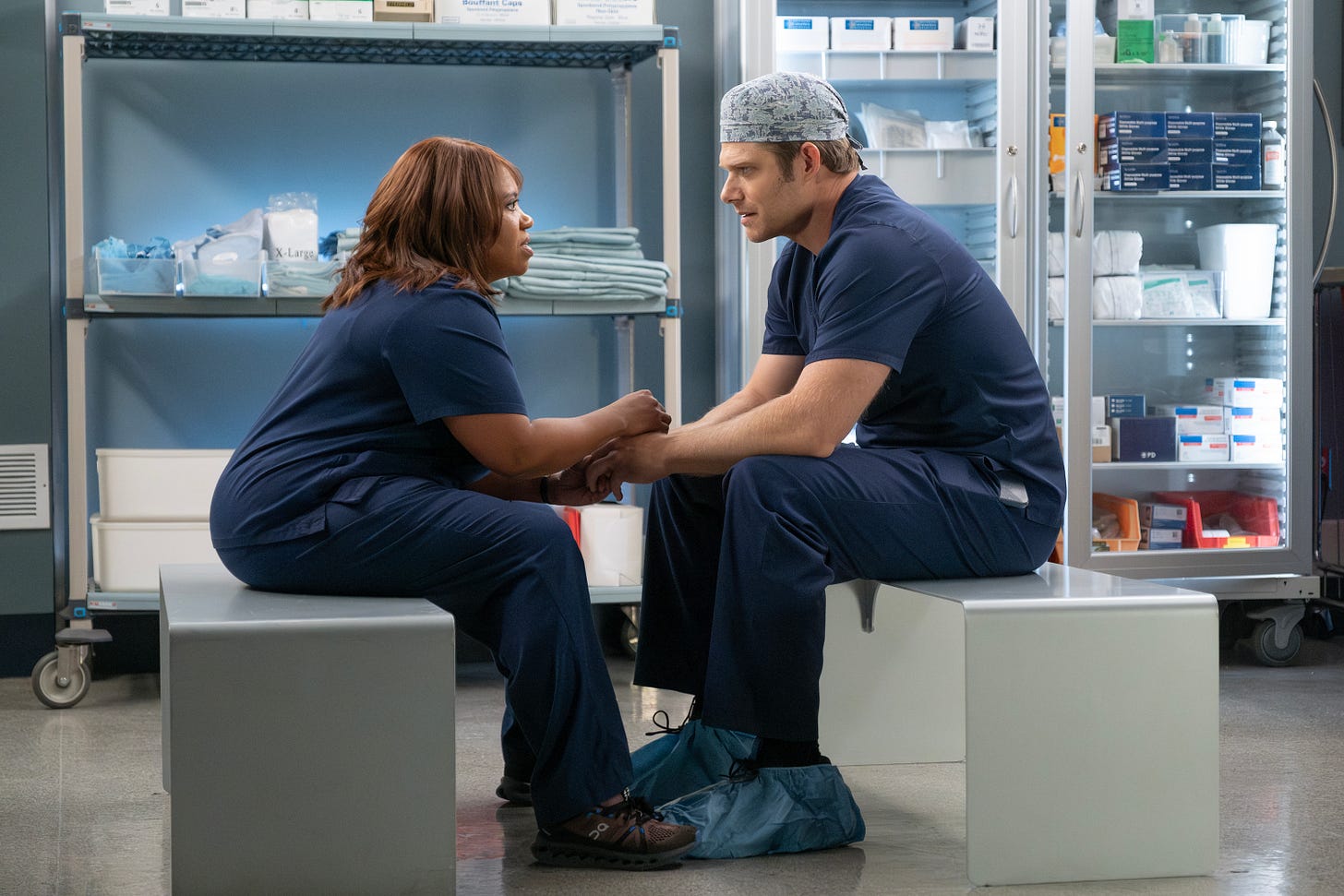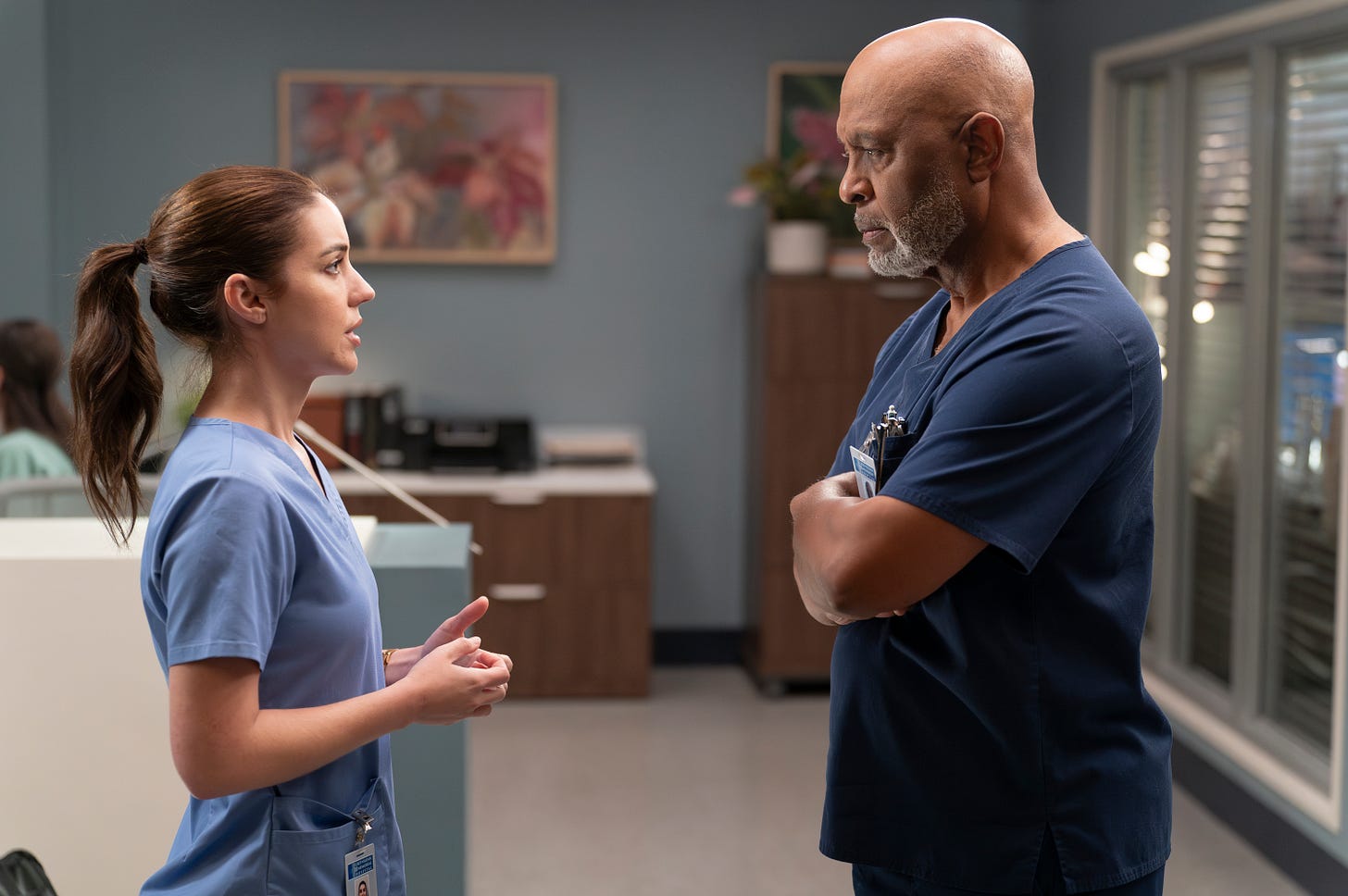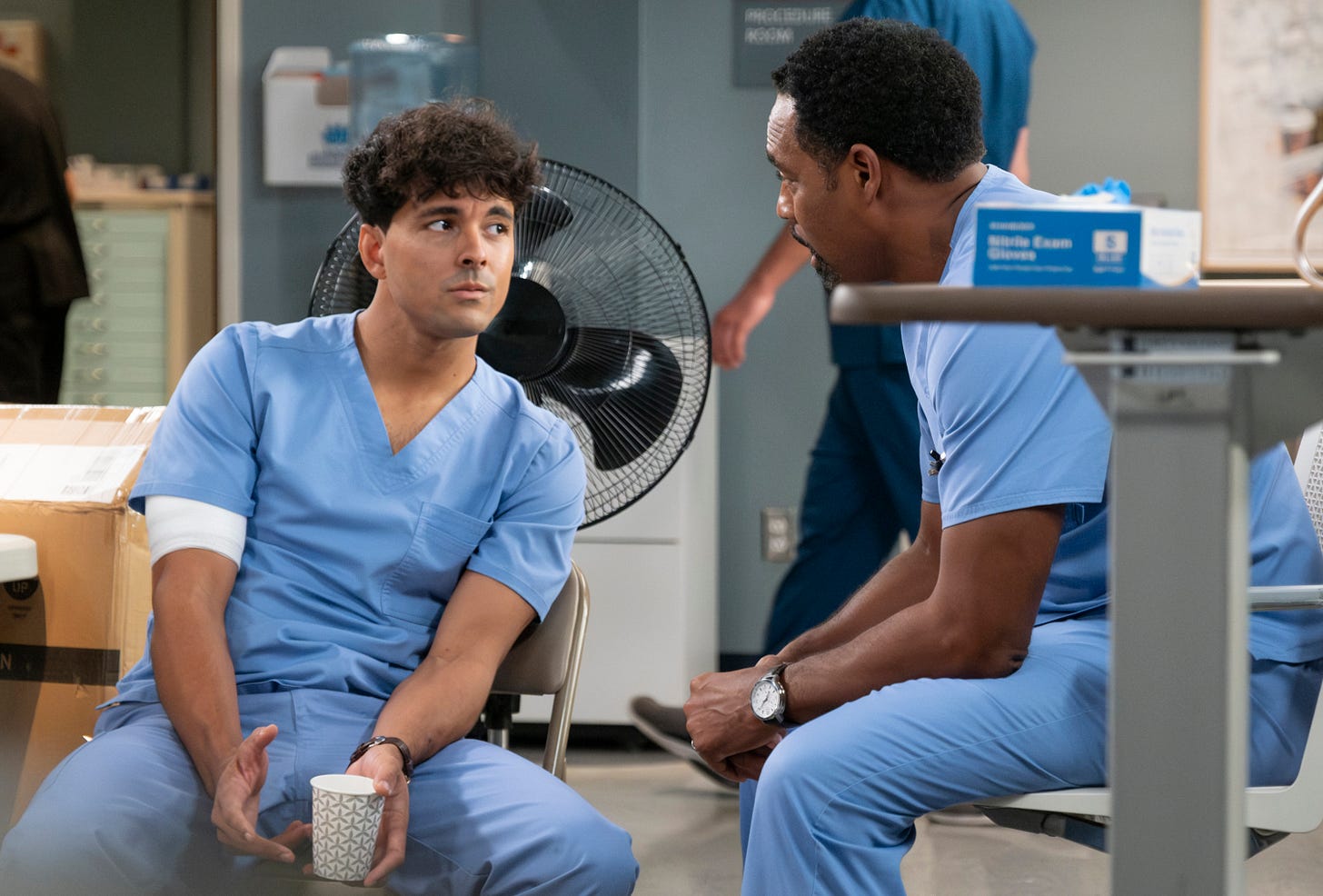Notes on 'Grey's Anatomy' Season 21 Episode 9: "Hit the Floor"
On Grey's Anatomy's long-form storytelling and trying to be more intentional about what I give my attention
If you enjoy my writing and want to support this newsletter, please consider becoming a paid subscriber for $5/month. As always, the majority of my posts will remain free.
“In a rare instance, when a patient died while hooked up to brain monitors, doctors saw an increase in brain activity right before and after his heart stopped. The brain waves that surged were associated with dreaming, information processing, and memory recall. It confirms what we often hear when we revive a patient in cardiac arrest — that right before their heart stopped, they saw their life flash before their eyes.” - Meredith Grey
I’ve consistently watched Grey’s Anatomy once a week for the last decade.
Since 2015, I will watch new episodes live or the following day. In fairness, when life gets a little busy, I let a few queue up and then spend a night catching up.
Mostly, though, I look forward to an hour (with commercials) of Grey’s Anatomy every week. The show is big and dramatic and emotional, and I like to have that space to feel all the feelings with characters whom I have known for years. It’s familiar and comfortable, and I plan to continue watching the show until it ends.
Whenever that happens, I’ll surely fall into yet another rewatch if not out of pure denial that Grey’s Anatomy is actually over. It feels weird to imagine TV without it.
I’ve already written about my relationship with the longest-running medical drama. I’ve even written about why it takes so much for me to invest in other shows in the genre. (I love Brilliant Minds, and I’m sure I will check out The Pitt.)
But it wasn’t until I watched Grey’s Anatomy Season 21 Episode 9, “Hit the Floor,” that I really told myself I don’t need to be invested in all the medical dramas, let alone all the TV shows on air and on streaming platforms. Not only is that impossible for me to do, but it’s also not something I’m interested in doing.
The thought became really clear after Dr. Miranda Bailey gave Dr. Atticus “Link” Lincoln some advice about how to show up for his girlfriend, Dr. Jo Wilson. In one of the episode’s standout scenes, she told him:
“When I was in labor with my son, his father was getting emergent brain surgery. Now, I initially didn’t know about it because my OB never let it show on her face. She knew that I was at my most vulnerable, and she supported me with a strength that I will never forget. Jo has to do that on a daily basis. She treats those at their most vulnerable and stays calm. Right? They could be bleeding or have a prolapsed cord. She stays strong and encouraging because that’s her job. But today it should be yours. She’s terrified. So pull yourself together so she can fall apart.”
That personal anecdote is from Grey’s Anatomy’s second season, which premiered in 2005. Although it has been 25 years since then, one of the characters is still on the show to tell it and connect it to one of the new(er) characters.
That is incredible. That is unfathomable and unreplicable in today’s TV climate.
That OB — Miranda Bailey’s has-it-all-together-so-the-patient-doesn’t-have-to OB — was Dr. Addison Forbes Montgomery, who would lead Private Practice.
That show would become one of my favorite shows of all time. It’s one of the first shows I mention when someone says they need a TV recommendation. I wouldn’t have it without the show introducing Addison in one of the best TV moments ever in Grey’s Anatomy Season 1 Episode 9, “Who's Zoomin' Who?,” in May 2005.
I also wouldn’t have the same appreciation for Dr. Amelia Shepherd’s reaction to learning that her nephew (and Jo, and a woman working there) were stuck inside of a convenience store during an armed robbery without Private Practice.
Grey’s Anatomy Season 2 sees Derek Shepherd, Amelia’s brother and Lucas Adams’s uncle, discuss what happened to their father — he was killed after not handing over his watch during an armed robbery. Derek and Amelia were in their father’s shop at the time and witnessed their father’s death. Private Practice, which didn’t premiere until 2007 and Caterina Scorsone didn’t join until 2010, reexamines that life-changing event from Amelia’s point of view.
“Hit the Floor” is thorough enough that Grey’s Anatomy fans don’t need the supplementary viewing of Private Practice to understand what’s happening. Amelia saying, “I mean, that day shaped my whole life. And probably Derek’s, too,” does more than enough heavy lifting to fill in gaps for anyone who needs it.
Still, it’s impressive that this TV institution has such expansive richness.
There is a history there — a television-making history, a storytelling history, and, for me, a personal history. Frankly, I don’t know that I have it in me to invest in any other medical dramas — they could go on for 21 (and counting, hopefully) seasons, but also they could end overnight after one great season.
Of course, I keep watching Grey’s Anatomy because I love it and all of its scars.
But I also keep watching it because I have invested time and energy into it, and I don’t see that as a mistake. I find it rewarding. This episode and its reach into the past make me think about how and if I want to invest in things on the same level.
I’m so lucky to write about TV and stories — I love it. One of the main caveats is that it feels like I need to be watching every single show imaginable. Then, I stretch myself too thin and miss out on the things I like, including Grey’s Anatomy.
I’ve been trying to shake that Fear of Missing Out this year by reinvesting in the importance of being intentional with my attention and time. Giving both to everything all of the time is as unsustainable as doomscrolling. I know both habits will be hard to break, so it feels attainable to start with TV.
I’m trying to pull back on having my phone in my hand while I watch TV. I have become so bad about scrolling hashtags to see what others think or browsing IMDB. Unsurprisingly, that often leads to me reading any news story that pulls my attention so far away from the TV show I’m using to try to decompress. Needless to say, I don’t need to split my attention between two blue light screens.
Likewise, it is perfectly okay not to be tuned into every single “prestige TV show,” whatever that may mean at the given moment. I also don’t need to lock into every new network show. It’s weird yet necessary to remind myself that I can spend time doing other things instead of trying to keep up with everyone’s interests.
Since trying to be more intentional with these changes, I spend much more time away from my devices. I have increasingly more time to read, which has been an absolute dream. Guess who has finally started her first Emily Henry book?
I’m listening to all of my favorite podcasts again. I’m going on more walks. I’m watching more sports. I’m crocheting a blanket I’ve been meaning to finish.
I’m also enjoying the time I dedicate to my favorite shows more than before.
I’m not endlessly scrolling while I watch them. While helping me adjust my relationship with social media, it’s also making it easier to appreciate the storytelling in front of me at that moment. Daredevil: Born Again has become appointment viewing after three episodes. I’m eager to see the new season of The Wheel of Time. I anticipate my nightly rewatches of New Girl and The Mindy Project. And you can bet I’ll be watching Grey’s Anatomy on Thursday night.
“What happens in our brains in the moments before we die has puzzled scientists for centuries. While we have some evidence flashing before our eyes, there are still many questions. No one knows exactly why it happens. Some people think it’s biology. Others believe it’s spiritual. What we know for sure is that you can try to look away, pushing down all the uncertainty and pain, but your life will catch up with you in the end.” - Meredith Grey
Until next time,
💌 Shelby


